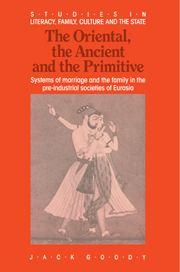 The Oriental, the Ancient and the Primitive
The Oriental, the Ancient and the Primitive Published online by Cambridge University Press: 09 January 2010
In the three previous chapters on India, I have discussed marriage and the transmission of property to women in one locality, then looked at the distribution of this and other family variables in the hierarchy and finally examined their regional spread in North and South. Before finally reviewing the status of theoretical approaches to these differences, I want to consider an attempt to discuss differences of a more specific kind that gives prominence (but not exclusively so) to modes of production. At the same time, I want to provide a link back to Tibet and forward to West Asia. To do this I turn to Gough's analysis of kinship in two areas of South India, Thanjavur (1981) and Kerala (1961), which is especially valuable as she looks at a region of the country on a comparative and historical basis in a way that emphasises the wider interdependence of castes in relation to state organisations embracing both town and country, subject and ruler.
There are broadly two types of possible explanations of differences: the historical and the sociological. I use these terms advisedly, since they are neither alternatives nor yet completely distinct; any enquiry needs to take into account both the past and the present. But, quite apart from the selection of the significant factors, there is the question of how far into the past one should search. Moreover, when we isolate historical factors as potential elements in an explanation, we still have to show their relevance to the ethnographic present, to the analytic moment.
To save this book to your Kindle, first ensure [email protected] is added to your Approved Personal Document E-mail List under your Personal Document Settings on the Manage Your Content and Devices page of your Amazon account. Then enter the ‘name’ part of your Kindle email address below. Find out more about saving to your Kindle.
Note you can select to save to either the @free.kindle.com or @kindle.com variations. ‘@free.kindle.com’ emails are free but can only be saved to your device when it is connected to wi-fi. ‘@kindle.com’ emails can be delivered even when you are not connected to wi-fi, but note that service fees apply.
Find out more about the Kindle Personal Document Service.
To save content items to your account, please confirm that you agree to abide by our usage policies. If this is the first time you use this feature, you will be asked to authorise Cambridge Core to connect with your account. Find out more about saving content to Dropbox.
To save content items to your account, please confirm that you agree to abide by our usage policies. If this is the first time you use this feature, you will be asked to authorise Cambridge Core to connect with your account. Find out more about saving content to Google Drive.